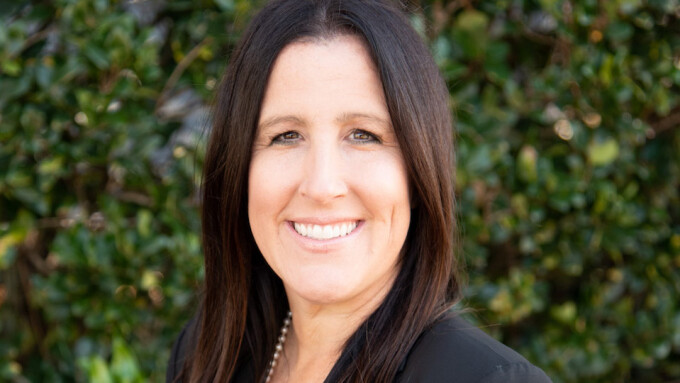BATON ROUGE, La. — A new law creating more liability for adult websites, promoted by the religious Republican legislator behind Louisiana’s controversial age verification law and by lobbyists for the AV industry, moved forward in the Louisiana state house yesterday.
The House Committee on Commerce voted 15-1 to advance House Bill 77, which would “let the state attorney general pursue civil penalties against companies that do not comply with a law that requires pornography websites to verify the age of its users,” the Louisiana Illuminator reported. Only one Democratic representative voted in opposition.
HB 77 was introduced by faith-based therapist and local politician Laurie Schlegel (R-Matairie), the anti-porn activist behind Louisiana’s Act 440, the controversial law that took effect Jan. 1 and requires “age verification for any website that contains 33.3% or more pornographic material.”
As XBIZ reported, Schlegel believes that “pornography is destroying our children and they’re getting unlimited access to it on the internet.”
A Religious Therapist's Own Version of the Miller Test
HB 77 calls for “investigation and pursuit of actions for commercial entities that knowingly and intentionally publish or distribute material harmful to minors and that fail to perform reasonable age verification.”
Republicans throughout the country are currently seeking to outlaw all adult content by overturning the 1973 “Miller Test” differentiating First Amendment-protected sexual material from illegal “obscene” material produced to appeal to “a prurient interest.”
Accordingly, to define “material harmful to minors,” Schlegel created her own version of the Miller Test, establishing the following standard:
“‘Material harmful to minors’ means any picture, image, graphic image, file, film videotape, or other visual depiction that meets all of the following criteria: (a) Taken as a whole and with respect to minors, appeals to the prurient interest in nudity, sex, or excretion. (b) Depicts, describes, or represents, in a patently offensive way with respect to what is suitable for minors, an actual or simulated sexual act or sexual contact, actual or simulated normal or perverted sexual acts, or lewd exhibition of the genitals. (c) Taken as a whole, lacks serious literary, artistic, political, or scientific value as to minors.”
Schlegel’s phrasing, specifying vague standards as applicable “to minors,” raised concerns among several free speech groups, and led the lone committee member to oppose the bill, Rep. Candance Newell (D-New Orleans), to comment that “the bill’s language is overly broad and might give the attorney general room for personal interpretation,” the Illuminator reported.
“I just want to make sure that this can be used with any attorney general because, as we know, we’re getting a new one next year, and we want to make sure that you have the proper guidelines in place, so that what is deemed as inappropriate doesn’t change from administration to administration,” Newell said.
Schlegel's Obsession with 'Perverted Sexual Acts'
Schlegel's rewrite of the Miller Test expanded a plain reference to “sexual conduct” into what appears to be her own feverish fantasy of what such content might entail. For the religious therapist and Republican politician, that involves “prurient interest in nudity, sex, or excretion” and “an actual or simulated sexual act or sexual contact, actual or simulated normal or perverted sexual acts, or lewd exhibition of the genitals.”
Chris Kaiser, advocacy director of the Louisiana ACLU, expressed concerned that Schlegel’s proposed law is actively supported by lobbyists for contractors that are already profiting from Schlegel’s age verification mandate.
Since Act 440 went into effect, the Illuminator reported, several major pornography websites — including Pornhub — “have opted to require Louisiana users to log in to their websites with LA Wallet, a cell phone application that can carry a state-issued identification card.” The news site noted that lobbyists representing LA Wallet, a private company contracted by Louisiana, voiced support for HB 77.
“The First Amendment protects adults’ right to access protected speech, including pornography, in the privacy of their own homes,” Kaiser told the committee. “By requiring adults to provide age verification to that, it’s burdening their fundamental rights to free speech.”
Kaiser added that the penalties Schlegel is promoting — fining companies that violate the law up to $5,000 per day — would “further stifle protected speech.”
Other groups also showed up in opposition to HB 77.
“What purpose will this accomplish other than generating a reason for the attorney general’s office to pursue efforts of additional fines and fees?” Melissa Flournoy, founder of progressive organization 10,000 Women Louisiana, asked the committee. “Is this bill part of a larger strategy to promote censorship and limit access to publicly available information, including R-rated movies shown on cable TV and streaming services?”
Flournoy urged legislators to amend the bill “to include language that makes it clear sex education or other health-related information would not be targeted,” the Illuminator reported.






